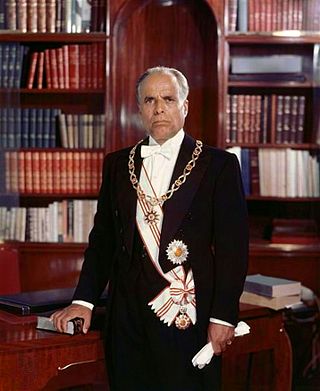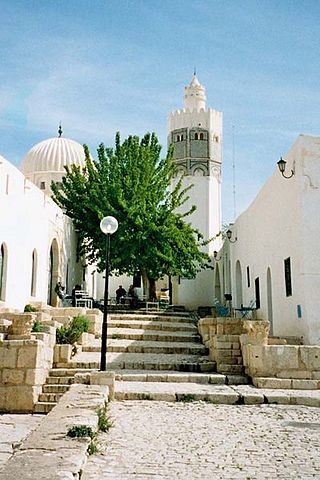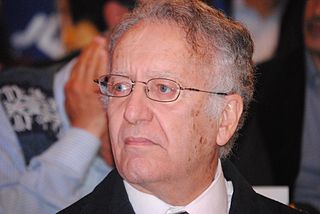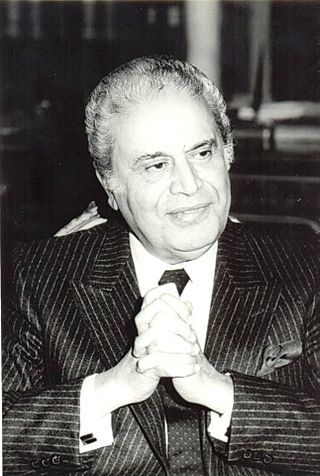Related Research Articles

Zine El Abidine Ben Ali, commonly known as Ben Ali or Ezzine was a Tunisian politician who served as the 2nd president of Tunisia from 1987 to 2011. In that year, during the Tunisian revolution, he fled to Saudi Arabia.

Habib Bourguiba was a Tunisian lawyer, nationalist leader and statesman who led the country from 1956 to 1957 as the prime minister of the Kingdom of Tunisia (1956–1957) then as the first president of Tunisia (1957–1987). Prior to his presidency, he led the nation to independence from France, ending the 75-year-old protectorate and earning the title of "Supreme Combatant".
Erraï is a weekly Arab language newspaper which was published in Tunis between December 1977 and December 1987.

El Kef, also known as Le Kef, is a city in northwestern Tunisia. It serves as the capital of the Kef Governorate.

Stade Tunisien or ST is a football club from Bardo, Tunis, Tunisia. Alongside Espérance de Tunis and Club Africain it forms the group of three best teams in the capital city region. Founded in 1948, it is the successor of the football section of the defunct Association of Young Muslims of Bardo founded in 1923. The team plays in green, red and white colours, after the Bey colours, as the team was under their patronage until the Tunisian independence. Their ground is Hedi Ennaifer Stadium, which has a capacity of 12,000.
Events from the year 1992 in France.
Tabarka–Aïn Draham International Airport, formerly Tabarka–7 November International Airport, is an airport serving Tabarka in Tunisia.
Sakher El Materi is a Tunisian businessman. He is the son-in-law of Zine El Abidine Ben Ali, who was President of Tunisia until 2011. In 2010, Materi's company Princesse El-Materi Holdings was operating in six industry sectors: News and Media, Banking and Financial Services, Automotive, Shipping and Cruises, Real Estate and Agriculture. A member of the ruling Constitutional Democratic Rally, he was elected as a Member of the Chamber of Deputies of Tunisia for the constituency of Tunis on 25 October 2009. He was struck off by the party after the 2011 Tunisian Revolution. After the revolution El Materi fled the country and went to the Seychelles.

Leïla Ben Ali is the widow of Zine El Abidine Ben Ali, who was President of Tunisia from 1987 to 2011. She married Ben Ali in 1992.

Yadh Ben Achour is a Tunisian lawyer, expert on public law and Islamic political theory. President of the Higher Political Reform Commission of Tunisia, he is then member of the United Nations Human Rights Committee.
Tunisia, officially the Tunisian Republic, is the northernmost country in Africa. It is a Maghreb country and is bordered by Algeria to the west, Libya to the southeast, and the Mediterranean Sea to the north and east. Its area is almost 165,000 square kilometres (64,000 sq mi), with an estimated population of just over 10.4 million. Its name is derived from the capital Tunis located in the north-east.
The mass media in Tunisia is an economic sector. Under the authoritarian regimes of Habib Bourguiba, and then Zine el-Abidine Ben Ali, it saw periods of liberalization and then challenges, notably due to Tunisian censorship. The 2010-2011 Tunisian protests and the subsequent change in government may bring significant change in this domain.

Mahmoud El Materi was a Tunisian physician and politician. He was the first president and one of the founders of the Neo Destour.

Mezri Haddad is a Tunisian journalist, writer, philosopher and diplomat. Haddad was a doctor of moral and political philosophy at the Paris-Sorbonne University, and the first Muslim candidate to be qualified by the National Council of French universities as a lecturer in Catholic theology. He is the author of several essays that focus on politics and religion.

Hassib Ben Ammar was a leading Tunisian politician and journalist/editor. He was a powerful campaigner for human rights.
The 1987 Tunisian coup d'état involved the bloodless ousting of the aging President of Tunisia Habib Bourguiba on 7 November 1987, and his replacement as President by his recently appointed Prime Minister, Zine El Abidine Ben Ali. The action was justified by reference to Bourguiba's failing health and Article 57 of the country's constitution. Reports later surfaced to indicate that the Italian intelligence services had been involved in planning it.
Tarek Bouchamaoui is a Tunisian businessman and football personality, member of the FIFA Council, member of the executive committee of the Confederation of African Football (CAF), and was head of CAF's referees committee from 2011 to 2013.
The Habib Bourguiba bibliography includes major books about President Habib Bourguiba of Tunisia, his biography, presidency and policies.
Habib Ben Ali, also known as Moncef El Habib Ben Ali was a Tunisian criminal and younger brother of former President Zine el-Abidine Ben Ali.

Hédi Mabrouk (1921–2000) was a Tunisian statesman, diplomat and politician. After serving as governor of different provinces between 1956 and 1962 he headed various state-owned companies. He was the ambassador of Tunisia to France from 1973 to 1985 and the minister of foreign affairs for one year between 1986 and 1987. He was the last foreign minister of the Habib Bourguiba era and also, was also one of his allies.